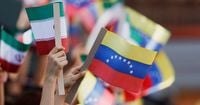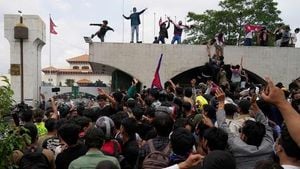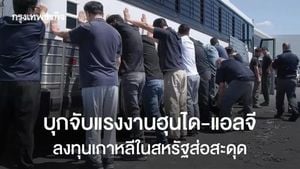As tensions between the United States and Venezuela reach a fever pitch, the Caribbean has become the stage for a dramatic military and diplomatic standoff. Over the past week, a flurry of military deployments, heated rhetoric, and international interventions have propelled the crisis to the top of the global agenda, raising fears of escalation and drawing in allies from around the world.
On September 5, 2025, members of Venezuela’s National Bolivarian Militia gathered in Valencia, answering President Nicolás Maduro’s urgent call to defend national sovereignty in the face of what he described as growing U.S. aggression. According to Reuters, the move came just days after the Trump administration ordered the deployment of 10 F-35 stealth fighter jets to a Puerto Rico airfield, a clear signal that Washington is ramping up its campaign against drug cartels in the southern Caribbean. The new jets—expected to arrive by late next week—add to an already formidable U.S. military presence in the region, which includes at least seven warships and more than 4,500 sailors and Marines.
President Donald Trump, pressed by reporters about the possibility of regime change in Venezuela, insisted, “We’re not talking about that, but we are talking about the fact that you had an election which was a very strange election, to put it mildly.” Trump’s remarks referred to the contested 2024 election, which the Venezuelan government maintains was won by Maduro. The U.S. president’s comments, however, did little to quell suspicions in Caracas. On state television, Maduro countered, “The government of the United States should abandon its plan of violent regime change in Venezuela and in all of Latin America and respect sovereignty, the right to peace, to independence.”
Despite the war of words, Maduro adopted a measured tone, saying, “I respect Trump. None of the differences we’ve had can lead to a military conflict. Venezuela has always been willing to converse, to dialogue.” Yet, in a speech at a Caracas military base, the Venezuelan leader also made clear his readiness to defend the nation’s independence. “Venezuela is always ready for dialogue, but we demand respect,” he declared, according to the Associated Press. “None of our differences justify a high-impact military conflict in South America.”
The roots of the crisis lie in the U.S. administration’s stepped-up anti-drug-trafficking operations in Latin America. On September 2, U.S. forces carried out a strike in the Caribbean, sinking a boat they claimed was operated by the Venezuelan gang Tren de Aragua and smuggling drugs to the United States. The strike killed 11 people. While Trump asserted the crew were members of Tren de Aragua—a group his administration designated a terrorist organization in February—Caracas has disputed the American narrative, insisting that the gang was rendered inactive by a 2023 prison raid. U.S. officials have yet to provide evidence supporting their claims about the boat’s crew or cargo.
Trump, seeking to justify the muscular military activity, drew a stark comparison: “Think if you’re in a war and you lose 300,000…We’re not going to allow it to happen.” He was referencing the staggering number of Americans lost to drug overdoses—a figure he likened to wartime casualties. The White House, Pentagon, and State Department have not clarified the legal basis for the strike, nor have they responded to questions about the deployment of F-35s or the recent incidents involving Venezuelan fighter jets.
The military buildup has not gone unnoticed in Venezuela or among its allies. On September 7, Iranian Foreign Minister Abbas Araghchi and Venezuelan Foreign Minister Yván Gil Pinto discussed the crisis in a phone call, as reported by Iranian state media. Gil described the situation as Venezuela facing “illegal threats” from Washington and thanked Tehran for its “principled support of the UN Charter and respect for national sovereignty.” Gil further stated, “The government and people of Venezuela will firmly defend their independence, sovereignty and right to self-determination,” expressing hope that BRICS members and Latin American states would condemn U.S. actions. Araghchi, for his part, strongly condemned what he called “unilateral and bullying measures” by the United States, labeling them a “clear violation” of the UN Charter and a threat to global peace and security. He assured Venezuela of Iran’s solidarity “in the face of U.S. coercion.”
Meanwhile, the Trump administration’s narrative has consistently sought to tie Maduro’s government to narcotrafficking. Trump has accused the Venezuelan president of running the Tren de Aragua gang, an allegation Maduro flatly rejects. U.S. Defense Secretary Pete Hegseth has gone so far as to call Maduro “effectively a kingpin of a drug narco state.” The U.S. recently doubled its reward for Maduro’s arrest to $50 million, a move the Venezuelan leader cited as evidence of an attempt to fabricate grounds for regime change.
The situation has also drawn sharp criticism from within the United States. Representative Ilhan Omar of Minnesota condemned what she called Trump’s “lawless” actions in the Caribbean, arguing, “Congress has not declared war on Venezuela, or Tren de Aragua, and the mere designation of a group as a terrorist organization does not give any President carte blanche to ignore Congress’s clear Constitutional authority on matters of war and peace.” Her comments reflect broader concerns about executive overreach and the lack of Congressional oversight in the unfolding crisis.
For many in Latin America, the specter of U.S. intervention evokes painful memories. As AP noted, the strike and subsequent buildup have “ruffled feathers across Latin America, a region that has suffered the long-term effects of previous American incursions.” Maduro, dressed in camouflage as he oversaw the mobilization of civilian militias, warned there would be an “armed struggle” in the event of an attack. Yet, he also reiterated Venezuela’s willingness to talk, emphasizing that “none of our differences justify a high-impact military conflict in South America.”
Despite the heightened rhetoric and the presence of thousands of U.S. military personnel conducting amphibious training and flight operations in southern Puerto Rico, U.S. officials have not suggested a ground incursion is imminent. Still, the deployment of advanced stealth fighters and naval assets has been interpreted in Caracas as a serious threat. Maduro’s government has used the perceived danger to rally support at home, even as his political base has eroded in recent years.
In the midst of these developments, the call for dialogue remains. Both Maduro and his foreign minister have expressed a willingness to engage, provided that Venezuela’s sovereignty is respected. The coming weeks will test whether diplomacy can prevail over confrontation—or if the Caribbean will witness a new chapter in the long and turbulent history of U.S.-Venezuelan relations.
The world watches as the crisis unfolds, with the fate of regional stability hanging in the balance.




